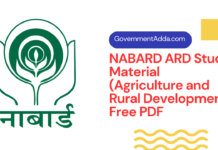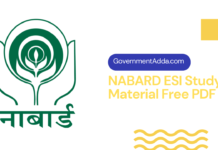Hello Aspirant ,
As we know that National Bank for Agriculture and Rural Development (NABARD) has declared the Grade A Officer (Assistant Manager) Notification. So all of you must be looking for a great Study Plan & Preparation Tips and Tricks for Agriculture and Rural Development (ARD) and full fill your dream to be a NABARD Grade a Officer. Keeping this in mind we have prepared a best Study Plan to crack NABARD Agriculture and Rural Development (ARD) like a pro.
NABARD Agriculture and Rural Development. You must prepare this section thoroughly because:
- The work of National Bank is built around this field and, therefore, familiarity with this subject is essential.
- This section carries 40 marks. Therefore, a good score in this subject can increase your overall score.
First of all have a look at Agriculture & Rural Development complete syllabus.
Agriculture & Rural Development: Agriculture: definition, meaning and its branches, Agronomy: definition, meaning and scope of agronomy. Classification of field crops. Factors affecting on crop production, Agro Climatic Zones; Cropping Systems: Definition and types of cropping systems. Problems of dry land agriculture; Seed production, seed processing, seed village; Meteorology: weather parameters, crop-weather advisory; Precision Farming, System of Crop Intensification, organic farming;
a) Soil and Water Conservation :Major soil types, soil fertility, fertilisers, soil erosion, soil conservation, watershed management;
b) Water Resource:Irrigation Management: types of irrigation, sources of irrigation, crop-water requirement, command area development, water conservation techniques, micro-irrigation, irrigation pumps, major, medium and minor irrigation.
c) Farm and Agri Engineering: Farm Machinery and Power, Sources of power on the farm- human, animal, mechanical, electrical, wind, solar and biomass, bio fuels, water harvesting structures, farm ponds, watershed management, Agro Processing, Controlled and modified storage, perishable food storage, godowns, bins and grain silos.
d) Plantation & Horticulture:Definition, meaning and its branches. Agronomic practices and production technology of various plantation and horticulture crops. Post-harvest management, value and supply chain management of Plantation and Horticulture crops.
e) Animal Husbandry:Farm animals and their role in Indian economy, Animal husbandry methods in India, common terms pertaining to different species of livestock, Utility classification of breeds of cattle. Introduction to common feeds and fodders, their classification and utility. Introduction to poultry industry in India (past, present and future status), Common terms pertaining to poultry production and management. Concept of mixed farming and its relevance to socio-economic conditions of farmers in India. Complementary and obligatory nature of livestock and poultry production with that of agricultural farming.
f) Fisheries:Fisheries resources, management and exploitation – freshwater, brackish water and marine; Aquaculture- Inland and marine; biotechnology; post-harvest technology. Importance of fisheries in India. Common terms pertaining to fish production.
g) Forestry:Basic concepts of Forest and Forestry. Principles of silviculture, forest mensuration, forest management and forest economics. Concepts of social forestry, agroforestry, joint forest management. Forest policy and legislation in India, India State of Forest Report 2015. Recent developments under Ministry of Environment, Forest and Climate Change.
h) Agriculture Extensions:Its importance and role, methods of evaluation of extension programmes, Role of Krishi Vigyan Kendra (KVK) in dissemination of Agricultural technologies.
i) Ecology and Climate Change:Ecology and its relevance to man, natural resources, their sustainable management and conservation. Causes of climate change, Greenhouse Gases (GHG), major GHG emitting countries, climate analysis, distinguish between adaptation and mitigation, climate change impact to agriculture and rural livelihood, carbon credit, IPCC, UNFCCC, CoP meetings, funding mechanisms for climate change projects, initiatives by Govt of India, NAPCC, SAPCC, INDC.
j) Present Scenario of Indian Agriculture and Allied activities;recent trends, major challenges in agriculture measures to enhance viability of agriculture. Factors of Production in agriculture; Agricultural Finance and Marketing; Impact of Globalization on Indian Agriculture and issues of Food Security; Concept and Types of Farm Management.
Rural Development: Concept of Rural Area, Structure of the Indian Rural Economy Importance and role of the rural sector in India- Economic, Social and Demographic Characteristics of the Indian rural economy, causes of Rural Backwardness.
Rural population in India; Occupational structure, Farmers, Agricultural Labourers, Artisans, Handicrafts, Traders, Forest dwellers/tribes and others in rural India- Trends of change in rural population and rural work force; problems and conditions of rural labour; Issues and challenges in Handlooms
Panchayati Raj Institutions – Functions and Working. MGNREGA, NRLM – Aajeevika, Rural Drinking water Programmes, Swachh Bharat, Rural Housing, PURA and other rural development programmes.
A lot of preparation will have to be done from online material. So the books you should read from are:
| Name | Authors |
| Agriculture at a Glance |
R K Sharma |
| Rural Development: Indian Context |
GPH Books |
Here are some important tips and strategies on how to prepare for NABARD Economic and Social Issues.
Agriculture and Rural Development: This will be the trickiest section of the whole recruitment exercise. Most of the candidates are not aware of the topics mentioned in the syllabus. Grab a book with a very elementary description of agriculture issues or go for internet browsing. Take a topic and read about it not in great detail, but as much as you know it. The questions are expected to be directed in this section, so do not take much stress regarding this. Read again and again since this will be new for most of you. Complete the whole syllabus at least once before going for the examination.
- Agriculture Facts and GK Questions – Read Major Crops in India, Cash Crops, Major Crop Seasons, Leading Crop Producing States, States & Crops, Major Agricultural Forest, etc.
- Irrigation and Farming in India – Get to know important points about intensive and extensive farming, Plantation, terrace farming, jhum farming, mixed farming, ley farming (animal husbandry) and much more.
- Crops in India – Detailed and significant knowledge of Kharif, Rabi and Zaid crops, Categories of Crops, climatic conditions favorable to grow crops is crucial for you to ace your NABARD exam.
- DD Kisan: DD Kisan is a 24-hour television channel based upon news related to Indian agricultural sector.
- Department of Agriculture Cooperation & Farmers Welfare: You can get details about all programs and schemes pertaining to Indian agriculture.
- Static GK – Agriculture Facts: Read about facts related to Agriculture in India .
Apart from this, you should focus on reading as much as possible on Central Government policies for agriculture and rural development. This will include both the notable and less popular policies and schemes. Even though the preparation necessary for this subject is basic, you must make sure that you are thorough in your knowledge.
Here, we suggest you cover current affairs on topics in ARD from the following sources:
- The Hindu Newspaper
- Kurukshetra
- The Economic Survey
- The Union Budget
- News on Schemes & Sub-schemes
Annual Reports of:
- Ministry of Agriculture
- Ministry of Rural Development
- NABARD
- Ministry of Environment, Forest, and Climate Change
Put what you learn into practice
- Practicing with Test Series helps you ace the original tests/examinations.
- Computer based Test Series for NABARD also help you save your time as they simulate the real tests and let you know you how to attempt the questions in a way that you are able to attempt the maximum number of questions within the stipulated time.
- It also gives you an All India Rank so as you can assess where you stand and how much more you need to work.
- Many test series comprise of a range of questions that equate the level of frequently asked questions, previous year questions, and new pattern questions for NABARD Prelims as well as Mains Examination.
| NABARD Grade A Assistant Manager 2018 Important Links | ||
| 1. | NABARD Assistant Manager Grade A 2018 Recruitment Notification Apply Online | Click Here |
| 2. | NABARD Grade A Officers Exam Syllabus 2018 – Prelims/Mains | Click Here |
| 3. | NABARD Grade A Officers Exam Pattern 2018 – Prelims/Mains | Click Here |
| 4. | NABARD Grade A Assistant Manager Previous Year Question Papers PDF – Download Here | Click Here |
| 5. | NABARD Grade A Previous Year Cut Off Marks | 2017, 2016, 2015 Cut Off Marks | Click Here |
| 6. | NABARD Grade A Assistant Manager Study Material | Books | ESI | ARD | English | GK Pdfs | Click Here |
| 7. | NABARD Grade A Assistant Manager ARD Agriculture and Rural Development PDF | Notes | Books | Click Here |
| 8.
9. 10. |
NABARD Grade A Assistant Manager Study Plan | How To Prepare For NABARD Grade A Officer Exam
NABARD ARD Study Plan & Preparation Tips and Tricks for Agriculture and Rural Development (ARD) NABARD ESI Study Plan & Preparation Tips and Tricks for Economic & Social Issues(ESI) |
Click Here |














